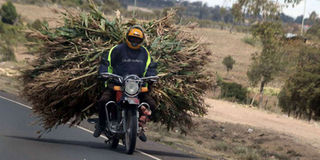Thriving dairy farming pushes maize farmers to increase acreage under animal feeds

A man ferries maize stalks for feeding dairy cattle in Nyeri. Perennial dry spells and a thriving dairy sector in the region has pushed farmers to increase the acreage under animal feeds such as hay and pasture in place of subsistence crops. FILE PHOTO | NMG
What you need to know:
- Counterfeit feeds that are being sold at a high prices have also pushed farmers into dairy farming which has proved lucrative in the recent days.
- Silage is high in energy and proteins and helps dairy cows produce more milk which is evident in our animals that have been yielding higher volumes of milk and for longer.
- Farmers have lost maize crop in the last three harvesting cycles last year as there were no adequate rains in the county.
Farmers in Nyeri are switching to commercial fodder farming to address the high cost of animal feeds as the dry weather continue to persist.
Perennial droughts and a thriving dairy sector has pushed farmers to increase the acreage under animal feeds such as hay and pasture in place of subsistence crops.
Maize previously planted for human consumption is now ending up in cattle troughs as farmers gamble on the abundance of carbohydrates and protein in the crop to boost milk production.
Counterfeit feeds that are being sold at a high prices have also pushed farmers into dairy farming which has proved lucrative in the recent days.
“With the cultivation of high quality feeds, we have cut down on the need to procure supplementary feed such as dairy meal and thus cut the cost of production,” said Mr Samson Ndegwa who has leased a land in Othaya.
Farmers are planting maize and within three months of maturity they are chopped off for silage.
‘Silage is high in energy and proteins and helps dairy cows produce more milk which is evident in our animals that have been yielding higher volumes of milk and for longer,” he said.
The emerging trend has been blamed for the maize deficit in the country that has seen the country import maize from Mexico last year to address maize shortage.
“Should more farmers pick up the trend there will definitely be an effect on the maize stock in the country due to competing interests because people are competing with cows for the same food,” said Mr Samuel Mugambi, a farmer In Tetu.
Farmers have lost maize crop in the last three harvesting cycles last year as there were no adequate rains in the county.





